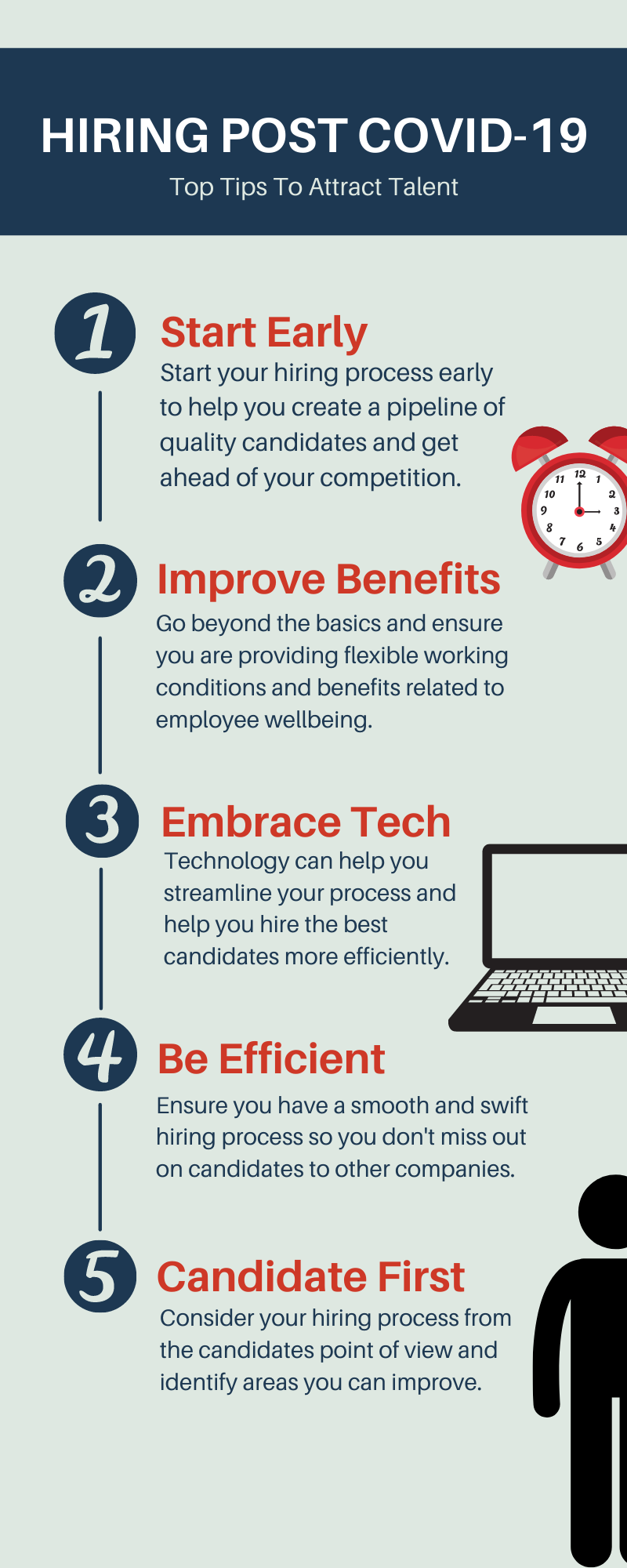As restrictions are being lifted and the world starts to open back up, what will happen to recruitment post Coronavirus? We take a look at the trends that have emerged during the pandemic and what that means moving forward.
Key Takeaways
- Covid-19 brought a number of challenges to recruiting that massively impacted companies traditional hiring processes.
- New innovations were needed including video interviews and other technologies.
- Many of these changes are predicted to remain after the pandemic as recruitment continues its recovery.
Recruitment Challenges During Covid-19
Before we take a look at the future, let’s take a moment to look back on how recruitment has changed during the pandemic.
Before Covid-19, the UK recruitment sector was steadily growing with the 2019 market valued at £42.3bn. Unemployment had fallen to the lowest levels since the 1970’s but this positive growth was swiftly undone as the pandemic saw record breaking increases in unemployment claims.
Like so many other areas, recruitment had to quickly adapt when the Coronavirus hit. Almost a quarter of UK jobs were placed on furlough, but some industries saw unprecedented demand, such as supermarkets, logistics, healthcare and technology.
The organisations that needed to recruit quickly faced a number of challenges. Social distancing rules meant in person interviews were no longer an option and hiring teams were now based remotely making the process even more complicated.
Companies had to adjust long established interview processes and onboarding new staff remotely presented several difficulties. With many workers suddenly having children at home during the day, there was also an increased need for flexible working and changes to long established work patterns.
With unemployment seeing such a huge rise it also meant that many roles were getting huge numbers of candidates. This meant recruiters had to find better ways to filter down candidates.
Innovation In Recruitment

These challenges have led to a number of changes in recruitment with video interviews becoming the standard choice. Gartner research showed that 86% of businesses have been conducting virtual interviews during the pandemic and 85% are using new technology to onboard employees.
Regardless of how you carry out your interview, you should keep in mind our advice on the key questions to ask. https://www.ecruit.com/blog/the-4-questions-you-should-ask-on-every-video-interview
The shift to remote working meant employers were now opening up to a wider talent base by removing location-based restrictions on candidates. There was increased collaboration across sectors and employers to help connect high job loss sectors and employers with vacancies.
It was not just employers that had to adjust to this new process. Candidates now needed to adapt to video interviews, online assessments, and telephone interviews.
Analytics tool could be used to scan resumes to present key insights or even evaluate video responses. Candidates had to adapt to understand how to optimise responses to increase the chances of making it through these initial stages. Despite the increase in technology, it was also important that companies showed empathy and understanding to candidates who had been through a challenging time.
Recruiters had to change the way they selected and interviewed candidates during the pandemic and many of these innovations will be here to stay. Telephone screening interviews and online interviews allowed a much more flexible approach and accelerated the time to hire.
The Future of Recruitment
It is clear to see that recruitment has shifted over the last 18 months, but what can we expect over the next few years?
In the short term, it is difficult to predict when some industries will start to see a full recovery. As holidays begin this summer and the leisure and hospitality sector re-emerge, we might see a slow period of growth or a sudden surge in interest and need for roles to be filled.
Candidate expectations have changed with employees looking for a more flexible working environment and many favouring the benefits of remote working. Job stability and safety are now front of mind for candidates which means companies will have to show they are employee centric.
According to the Prudential Financial’s Pulse of the American Worker survey, 1 in 4 workers is considering quitting their job after the pandemic. 72% of these workers say the pandemic caused them to rethink their skill set with 80% stating they are concerned about their career advancement. Organisations need to create a culture that focuses on employee retention to keep staff but also to attract new staff.
To help keep your remote staff happy and engaged, we put together 5 work from home policies you need to hear about.
The recruitment industry will have a hugely important role to play moving forward in helping employers fill roles but also in developing a new approach to recruitment with technology and culture at the heart of the evolution.
Top Tips To Hire Post Covid-19
As the economy starts to recover and companies look to ramp up recruiting, there are a number of steps that can be taken to help you hire successfully.
- Start Early: There is potentially going to be a surge in companies looking to recruit and so you need to take action early. Start considering what roles you want to advertise, what your process will look like and even begin to advertise roles in advance. You can get the early stages out of the way and do final interviews when you are ready to hire or just build up a candidate pipeline.
- Evaluate Your Benefits: Benefits have become even more important over the recent months and employees are looking for more than just the basic perks we have seen in the past. You need to consider benefits related to well-being along with a more flexible working approach. If you are competing with other companies, you need to make sure your benefits are stacking up.
- Embrace Technology: Technology can help you streamline your process and hire the best candidates. From managing your applications to facilitating your interview process, it is vital that you select the best technology to help you hire efficiently.
- Fight for talent: As the job market continues to grow, we are returning to a candidate-led market. This means each candidate will likely have multiple options available to them putting them in a position of power. When it comes to making a job offer, ensure you make a fair offer. Trying to get someone cheap might not go down well when they have several offers to compare. Be prepared to negotiate.
- Be Efficient: Ensure you have a smooth and swift hiring process. If you want candidates to go through a multistage process, then try and keep momentum by shortening the gaps between stages. The longer your process runs, the increased likelihood another company might get an offer in before you. That does not mean you should rush the process but react quickly and if you have found the right candidate, don’t hesitate to make your offer.
- Optimise The Candidate Experience: Efficiency is just one element of the hiring process, and you must consider this from the candidates point of view. Speak to current employees about the hiring process and identify areas that you can improve. Your hiring process can tell a candidate a lot about how your company is run so ensure you are making the right impression.

If you are looking to ramp up your recruitment in 2021 then ecruit can help. We help you attract the top talent at a fraction of the cost of traditional agencies. From writing optimised job descriptions, listing on the top job boards and managing your applicants, ecruit saves you time and money while recruiting the top candidates in your sector.
Book a 5 minute demo with our team to find out more.
.png?width=206&height=60&name=Untitled%20design%20(31).png)




